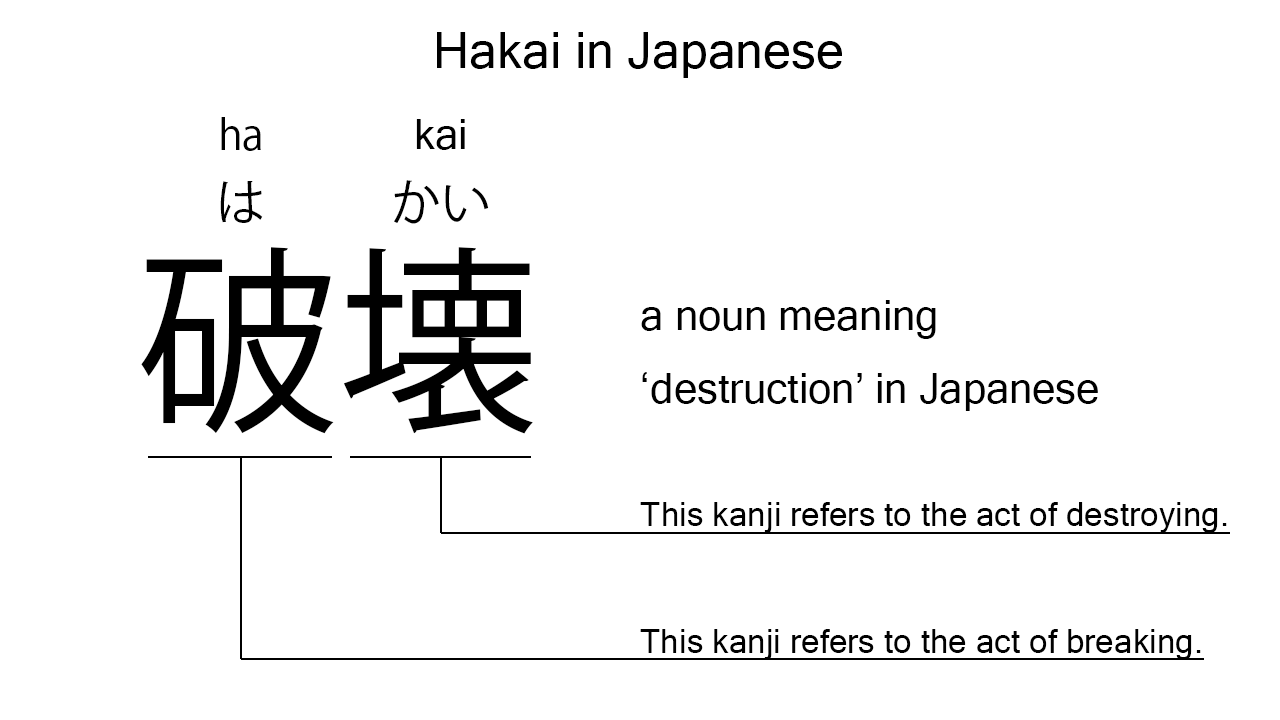What does “hakai” mean in Japanese?
There are homophones, but native speakers say “hakai” normally to mean ‘destruction’ in Japanese. Perhaps, some Japanese learners know this word as it is sometimes used in Japanese movies, video games, novels, manga, anime, and the like. In this blog post, however, I will explain this word in detail based on its kanji expression. And also, I will explain how to use it through example sentences. My explanations would help Japanese learners understand “hakai” more clearly. Then, let’s get started!
Contents
Definition and meaning of “hakai”
Let me start with the definition and meaning of “hakai”.
- hakai – 破壊 (はかい) : a noun meaning ‘destruction’ in Japanese.
The definition and meaning are simple and clear. To understand this noun more clearly, however, let me explain its kanji characters in detail, one by one.
Hakai in kanji
The kanji expression of “hakai” consists of the following two kanji characters:
- 破 : a kanji character used to refer to the act of breaking.
- 壊 : a kanji character used to refer to the act of destroying.
These two kanji characters tell us that the formed noun literally means ‘breaking and destroying’ in Japanese. This literal interpretation is very close to the actual meaning. Destruction is often a result of the act of breaking and destroying.

When we meet new kanji expressions, we should check their kanji characters in detail to understand their meanings clearly and deeply. In many cases, kanji characters tell us a lot about the meanings of the expressions they form. Actually, here, we could get the better understanding of “hakai” through the detailed kanji check above.
So far, I’ve explained the definition and meaning of “hakai” together with its kanji characters. Then, let me explain how to use it through the example sentences below.
Example #1: how to say “destruction” in Japanese
kankyou hakai ga ōkina mondai desu – 環境破壊が大きな問題です (かんきょうはかいがおおきなもんだいです)
Environmental destruction is a big problem.
Below are the new words used in the example sentence.
- kankyou – 環境 (かんきょう) : a noun meaning ‘environment’ in Japanese. This can also work as plural. Learn more about Japanese plural.
- ga – が : a case particle used to make the subject word or the object word in a sentence. In the example, this is used after “kankyou hakai” to make the subject in the sentence.
- ōkina – 大きな (おおきな) : a na-adjective meaning ‘big’ or such in Japanese. In the example, this works as a modifier in front of “mondai” to mean a ‘big problem’ in Japanese.
- mondai – 問題 (もんだい) : a noun meaning ‘problem’ in Japanese. This can also work as plural.
- desu – です : an auxiliary verb used after a noun or adjective to make it polite. Probably, this is well known as a part of Japanese desu form. In the example, this is used after “ōkina mondai” to make it sound polite.
This is a typical usage of “hakai”. In this example, it works together with the noun, “kankyou”, to mean ‘environmental destruction’ in Japanese.
Example #2: another usage of “hakai”
shinrin hakai wa hibi tsuzuki masu – 森林破壊は日々続きます (しんりんはかいはひびつづきます)
Forest destruction continues day by day.
Below are the new words used in the example sentence.
- shinrin – 森林 (しんりん) : a noun meaning ‘forest’ in Japanese.
- wa – は : a binding particle working as a case marker or topic marker. In the example, this works after “shinrin hakai” to make the subject in the sentence.
- hibi – 日々 (ひび) : an adverb meaning ‘day by day’ or such in Japanese.
- tsuzuki – 続き (つづき) : one conjugation of the verb, “tsuzuku”, which means ‘to continue’ in Japanese. In the example, it has been conjugated for the better connection with its following word.
- masu – ます : an auxiliary verb used after a verb to make it polite. Probably, this is well known as a part of Japanese masu form. In the example, this is used after “tsuzuki” to make it sound polite.
This is another typical usage of “hakai”. In this example, it works together with the noun, “shinrin”, to mean ‘forest destruction’ in Japanese. When we want to mean ‘destruction’ in Japanese, this noun is always a very good option.
Summary
In this blog post, I’ve explained the definition and meaning of “hakai” in detail based on its kanji expression. And also, I’ve explained how to use it through the example sentences. Let me summarize them as follows.
- hakai – 破壊 (はかい) : a noun meaning ‘destruction’ in Japanese. These two kanji characters literally mean ‘breaking and destroying’ in Japanese. This literal interpretation is very close to the actual meaning. Destruction is often a result of the act of breaking and destroying.
Hope my explanations are understandable and helpful for Japanese learners.